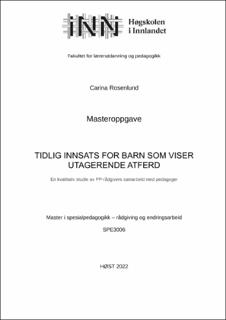Tidlig innsats for barn som viser utagerende atferd
Master thesis
Permanent lenke
https://hdl.handle.net/11250/3034176Utgivelsesdato
2022Metadata
Vis full innførselSamlinger
Sammendrag
Denne masteroppgaven har temaet tidlig innsats for barn som viser utagerende atferd. Studiet tar utgangspunkt i en kvalitativ tilnærming, med forankring i et fenomenologisk og hermeneutisk vitenskapeligståsted. Tidlig innsats har de senere årene blitt et velkjent begrep i barnehagesammenheng. Et begrep som alene ikke har et innhold. Derfor er formålet med dette studiet å fylle begrepet tidlig innsats med innhold i møte med barn som viser utagerende atferd. Utagerende atferd er en utfordring mange instanser er kjent med. Det er kjent at atferdsproblematikk tidlig i livet kan gi økt sjanse for større problemer senere i livet. Derfor er det viktig å rette oppmerksomheten mot dette temaet, og fremme hvordan barnehagen tidlig kan bidra til å redusere omfanget av utagerende atferd.
I studiet ville jeg undersøke temaet i et bredt spekter av fagkunnskap. Pedagogisk-psykologisk tjeneste er barnehagens samarbeidspartner (Barnehageloven, 2005, § 2b). Derfor ble valget å undersøke hvordan PP-rådgivere og pedagoger kan samarbeide for å redusere barns utagerende atferd, med fokus på tidlig innsats. På bakgrunn av dette ble problemstillingen:
Hvilke erfaringer har PP-rådgivere med utagerende atferd i barnehagen, og hvordan kan de gjennom tidlig innsats redusere dette i samarbeid med barnehagens pedagoger?
Problemstillingen er undersøkt ved å gjennomføre et kvalitativt forskningsintervju hvor jeg inviterte PP-rådgivere inn i studiet som intervjupersoner. Forskningsintervjuet inneholdt et semistrukturert intervju. Formålet med intervjuet var å få et nært innsyn i PP-rådgiveres personlige erfaringer, forståelse og opplevelser omkring temaet.
Oppsummert viser empirien at intervjupersonene hadde mye erfaringer med barn som viser utagerende atferd. De hadde ulike erfaringer og opplevelser rundt samarbeid med pedagoger. Intervjupersonene viste til mange tanker og refleksjoner på hvordan PP-rådgivere og pedagoger samarbeider for å vektlegge tidlig innsats for barn som viser utagerende atferd. Gjennom å drøfte funnene kom det frem at utagerende atferd er en måte barn uttrykker seg på. Atferden handler ofte om noe annet enn hva den viser seg som. Derfor må barn som viser utagerende atferd kartlegges bredt. Barnet må bli sett i lys av et helhetlig systemperspektiv, og barns utagerende atferd må bli sett i samspill med omgivelsene. For å forstå barns utagerende atferd, må fagpersoner bruke seg selv som verktøy i møte med barnet. This master's thesis has the theme of early intervention for children whit behavior problems. The study is based on a qualitative approach, anchored in a phenomenological and hermeneutic scientific standpoint. In recent years, early intervention has become a well-known term in the kindergarten context. A term that alone does not have a content. Therefore, the purpose of this study is to fill the terminology of early intervention with content when dealing with children who show acting-out behavior. Acting-out behavior is a challenge many instances are familiar with. It is well known that behavioral problems early in life can give an increased chance of greater problems later in life. It is therefore important to direct attention to this topic, and to promote how the kindergarten can help reduce the extent of acting out behavior at an early stage.
In my studies, I wanted to investigate the topic in a wide range of specialist knowledge. The Pedagogical-psychological service is the kindergarten's professional partner (Barnehageloven, 2005, § 2b). Therefore, the choice was to investigate how PP advisers and pedagogues can work together to reduce children's acting out behavior, with a focus on early intervention. Based on this, the problem was:
What experiences do PP counselors have with acting out behavior in the kindergarten, and how can they reduce this through early intervention in collaboration with the kindergarten's pedagogues?
These challenges has been investigated by conducting a qualitative research interview where I invited PP advisers into the study as interviewees. The research interview contained a semi-structured interview. The purpose of the interview was to gain a close insight into the PP advisors' personal experiences, understanding and experiences around the topic.
In summary, the empirical evidence shows that the interviewees had a lot of experience with children who display acting out behavior. They also had different experiences around collaboration with educators. The interviewees referred to many thoughts and reflections on how PP advisers and pedagogues work together to emphasize early intervention for children who show acting-out behavior. Through discussing the findings, it emerged that acting-out behavior is a way in which children express themselves. The behavior is often about something other than what it appears to be. Therefore, children who show acting-out behavior must be surveyed broadly. The child must be seen in the light of a holistic system perspective, and children's acting-out behavior must be seen in interaction with the environment. To understand children's acting out behavior, professionals must use themselves as tools when dealing with the child.
